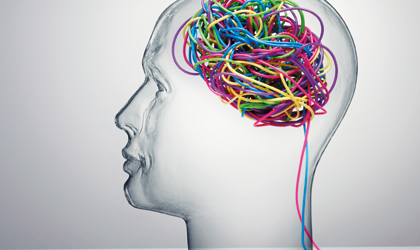
Let’s get physical!
Did you know that exercise and being physically active are not the same thing? Being physically active simply means that you’re mobile; walking the dog, making a cup of tea or visiting the shops. Taking exercise means that you are raising your heart rate to improve your fitness. It’s this activity that is of the most benefit to brain health. Increasing the blood flow around the body has positive effects on cerebral performance, so get that heart rate pumping! According to a study, improving your balance can also pave the way to a healthy brain. Balance and toning exercises may have a supporting effect on the part of the brain that controls mobility; better balance means we are less prone to trips and fallsi.
Learn something new
This is a no-brainer, now that we know how much the brain loves to be challenged. When we acquire new skills or absorb new information the brain establishes new connections between nerve cells. As we repeat the practice it strengthens these connectionsii. The brain makes complex decisions on how to process and store new material, using different pathways which helps to change our performance. It is this process we attribute to improved cognitive flexibility and our ability to learn.
Brain food
Nutrition plays a pertinent role in maintaining a sharp mind. By paying attention to the foods you consume you are supporting brain function and health. The well reported attributes of oily fish are not likely to have passed you by. We are certainly advocates of their health-giving properties. It is the essential fatty acids that the body cannot produce that we obtain from oily fish that nourish the brain; after all, as we now know, the brain is made up of 60% fat.
The most effective essential fatty acids for brain health are EPA and DHA and oily fish provides ample amounts of these nutrients in a bioavailable form. Almost 50% weight of the neuronal membranes is accounted by DHAiii. Widely known as omega 3s, these EFA’s build cell membranes and foster new brain cell development. Adding mackerel, sardines, pilchards or kippers to your diet, or linseed or chia seeds if you’re vegetarian, will support cognitive health. If fish is limited in your diet you may consider a high potency fish oil supplement. Leafy green vegetables, blueberries, nuts, eggs and seeds are all packed with brain loving nutrients and are easily incorporated into a daily menu.
Keeping our brain healthy
Possibly the greatest worry in ageing is the loss of our precious memories. Forgetting keys can affect anyone, but not recalling the names or faces of those we love is a frightening consideration. Keeping our brain in shape will help slow the natural cognitive decline of old age. Managing health conditions and staying in touch with your GP if you notice any changes are another important way to nurture brain health. It is natural that the brain ages, and yes, it will cause a certain amount of anxiety, but we’re all in it together. So, implementing some of the health hacks mentioned above and adopting a positive outlook can pave the way to better cognitive condition.
Brain health and hormones
Lapses in memory can also be attributed to perimenopause and menopause. Hormone levels reduce during this phase and oestrogen is one such hormone. Oestrogen has a role in regulating brain chemicals, many associated with the function of the nervous system. With oestrogen in shorter supply it cannot fulfil all of its duties as it once did, resulting in occasional forgetfulness. The reduction in hormones disrupts other body systems which can often cause sleep disturbances, hot flushes and anxiety – all of which can have a negative effect on recollection. ‘Baby brain’ is no joke, it’s a reality for many mum’s-to-be. Struggling to sleep, a change in diet or simply overwhelmed with all the preparations involved in welcoming a new life in to the world may be at the root of memory meltdown. Many pregnant women are juggling work commitments and other children, to name a few, so it’s little wonder why they may ‘drop the ball’ on occasion!
Worry, anxiety, stress
If your brain is in a perpetual cycle of distraction with these afflictions it’s likely that your memory might not be as sharp as it usually is. Perhaps it’s hard to think of little else than what concerns you and remembering just comes a little slower than normal. All too often sleep disturbances accompany worries which can cause lapses in memory. Finding solutions to your troubles isn’t always an easy task but managing the feelings they present is possible. Focused breathing, a walk, doing something you’re good at or being in good company can all help knock negative thoughts on their head.
Did you know?
76% of cat owners said that their feline friend helped them cope better with everyday life.iv
References:
-
AARP Staying Sharp. (2018). Try Touching Your Toes to Reach Peak Brain Health. Available online: https://stayingsharp.aarp.org/art/move/17/balance-exercise-brain.html [Accessed 31 August 2018].
-
BBC GCSE Bitesize. (2018). Complex Behaviour. Available online: http://www.bbc.co.uk/schools/gcsebitesize/science/add_ocr_21c/brain_mind/complexrev1.shtml [Accessed 31 August 2018].
-
Singh. S., (2005). Essential fatty acids, DHA and human brain. Available online: https://rd.springer.com/article/10.1007%2FBF02859265
-
Mental Health Foundation. (2018). Pets and mental health. Available online: https://www.mentalhealth.org.uk/a-to-z/p/pets-and-mentalhealth [Accessed 31 August 2018].
You Might Also Like

Keri
Keri Filtness has worked in the Nutrition Industry for 19 years. She is regularly called upon for her professional comments on health and nutrition related news. Her opinions have been featured by BBC3, Prima, Vitality, The Mirror, Woman’s Own and Cycling Weekly, amongst others. She has also worked one to one with journalists, analysing their diets and health concerns and recommending changes and additions, where appropriate.
View More



